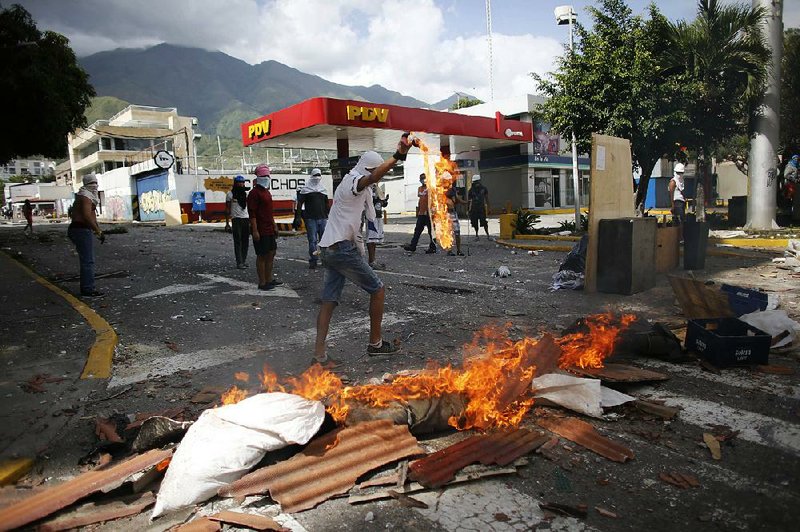CARACAS, Venezuela -- A nationwide strike against plans to rewrite the constitution shut down much of Venezuela's capital Thursday before breaking into sporadic violence that left at least two men dead.
President Nicolas Maduro pledged to forge ahead with reshaping Venezuela's government despite the protests and a U.S. threat to levy economic sanctions if he continued. Meanwhile, a coalition of opposition groups called for what it described as a "great march" on Saturday, returning to a strategy of direct confrontation with the government after a week of utilizing tactics such as organizing a nationwide protest vote against the constitutional rewrite.
In New York, a senior diplomat resigned from the Venezuelan delegation to the U.N. in what he called a protest of the Maduro administration's widespread human-rights violations.
Isaias Medina said in an interview that he could no longer tolerate working for a government that advocates for human rights at the U.N. and violates them at the same time. He is among the few members of Venezuela's government outside the opposition-controlled National Assembly to have broken ranks with it.
Medina called on Maduro to resign immediately.
"He needs to respond now before the international community," Medina said.
U.N. Ambassador Rafael Ramirez said on Twitter that Medina had acted dishonestly and been removed from his post.
In Caracas, wealthier, pro-opposition neighborhoods in the eastern part of the city were shuttered and silent until early afternoon, when improvised blockades left them almost entirely cut off from the rest of the city. Groups of masked men set fire to a handful of blockades and hurled stones at riot police, who fired back tear gas.
The chief prosecutor's office said Andres Uzcategui, 23, was killed in a protest in the working-class neighborhood of La Isabelica in the central state of Carabobo and Ronney Eloy Tejera Soler, 24, was killed in the Los Teques neighborhood on Caracas' outskirts. At least nine people were hurt in protests, the prosecutor's office said. It offered no details about the circumstances of the killings.
The death toll over several months of protests has reached at least 95.
A public transport strike appeared to have halted nearly all bus traffic, and thousands of private businesses defied government demands to stay open as Maduro's opponents called the first major national strike since a 2002 stoppage that failed to topple Maduro's predecessor, Hugo Chavez.
Maduro said said hundreds of Venezuela's largest companies were functioning "at 100 percent" despite the strike. Opposition leaders said Thursday evening that 85 percent of the nation's workers had participated in the strike.
Neither figure could be independently verified.
In neighborhoods of western Caracas traditionally loyal to the ruling party, some stores were closed but bakeries, fruit stands and other shops were open and hundreds of people were in the streets.
In the rest of the city, residents commented that the streets were emptier than on a typical Sunday.
The 24-hour strike was meant as an expression of national disapproval of Maduro's plan to convene a constitutional assembly that would reshape the Venezuelan system to consolidate the ruling party's power over the few institutions that remain outside its control. The opposition is boycotting a July 30 election to select members of the assembly.
"Definitively, we need a change," said Katherina Alvarez, a teacher. "The main objective is for people to see how dissatisfied people are."
Medina, the U.N. diplomat, said he decided he would resign from his post shortly after opposition protests began in early April, after a Supreme Court decision stripped the National Assembly of its remaining powers. Medina said he has never identified with either government or opposition parties, but was irked by images of national guardsmen and police launching tear gas and rubber bullets at protesters, many of them students.
Medina said he did not immediately resign because he wanted to finish organizing a U.N. environmental conference and needed his passport. He made the decision official in a letter and video shared widely on social media Thursday.
In the video, Medina says government leaders responsible for violence against protesters "will be considered murderers."
"I'm ready to stand forward and say what I'm saying because it's the correct thing to do," he added.
A Section on 07/21/2017
